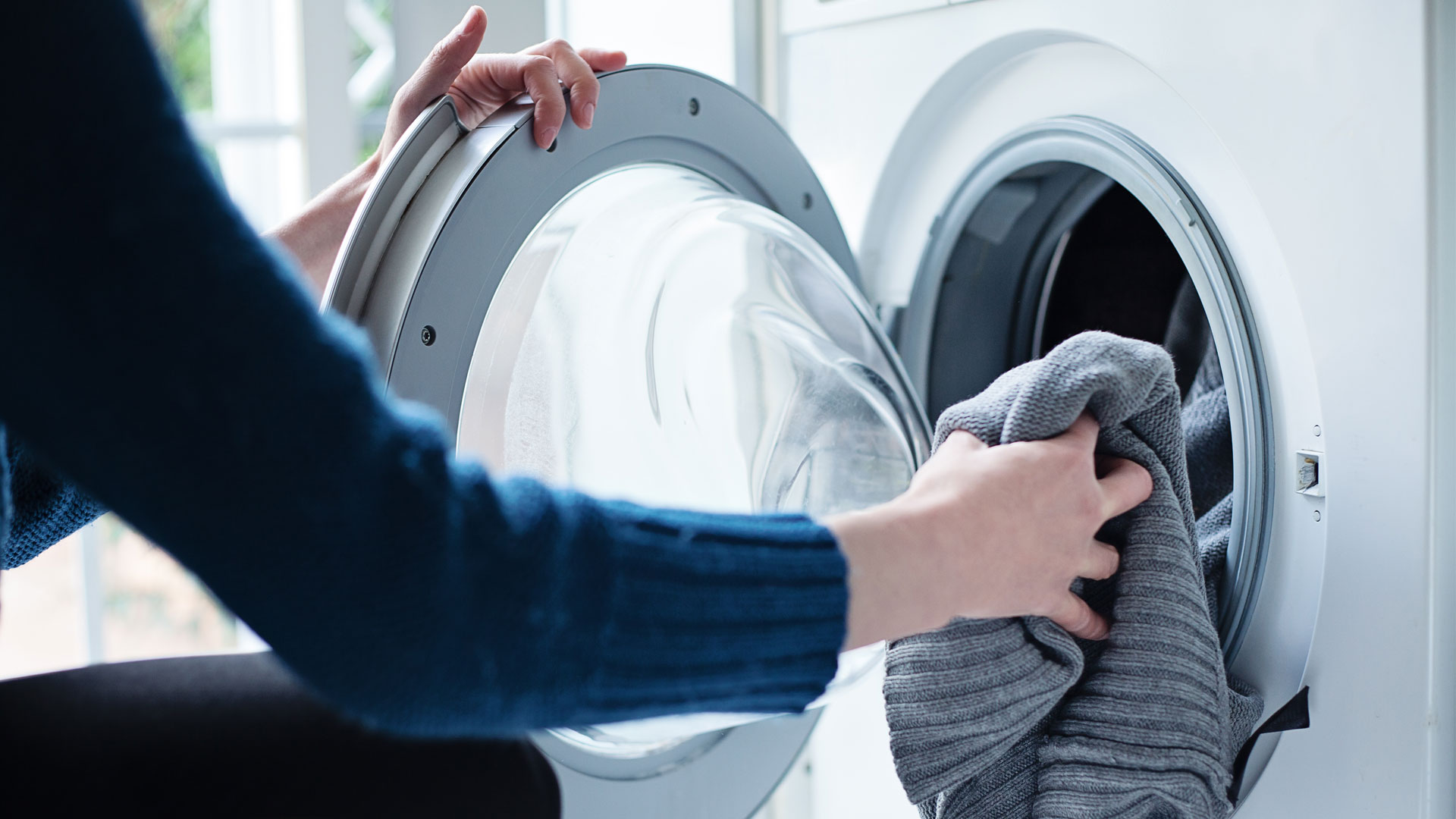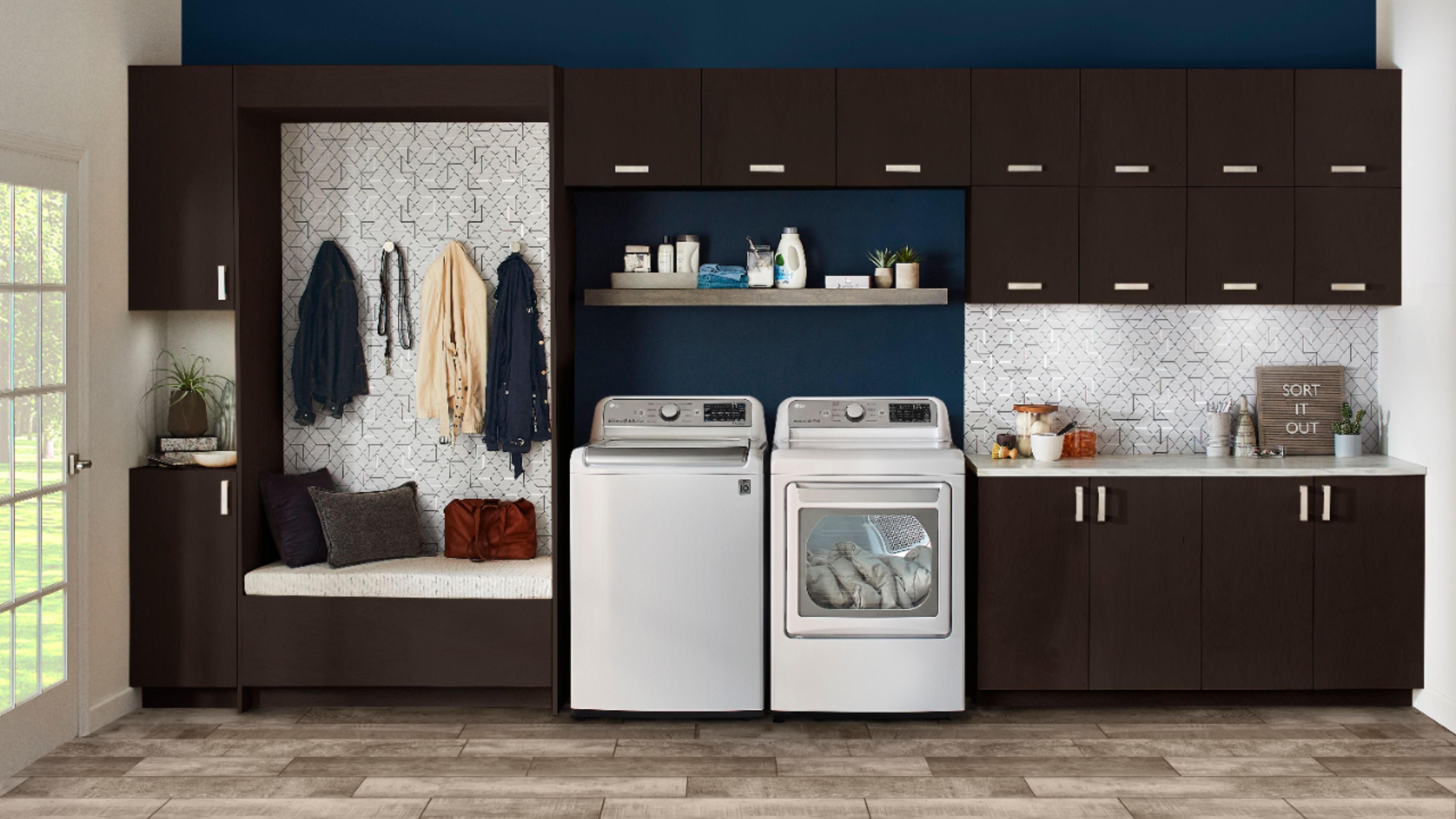
When shopping for a new dryer, most buyers are confronted with the decision between gas or electric models. But which is better: a gas dryer or an electric dryer? Ultimately, the best dryer depends on your working space and a few cost evaluations.
There's more to a dryer's specs than its energy type. Many of the same brands that make the best washing machines also produce matching dryers that are Energy Star certified and have smart steam settings. You can stack or place them side by side (although you can't stack them with top-load washers), and most dryers are available in gas and electric, so you're not limited when choosing one.
If you've found your dream dryer and it comes down to gas vs. electric, which dryer type is best for you?

Gas vs electric dryers: Price and Value
- Electric dryers typically have a lower purchase price and easier installation than gas dryers, costing $400 to $1,200.
- Gas dryers offer lower operating costs and faster drying times. Although they are more expensive upfront and require gas line installation, gas dryers are more energy-efficient in the long run.
Typically, electric dryers have a lower purchase price compared to gas dryers. Electric dryers usually cost $400 to $1,200, while gas dryers usually start at $500 and can go up to $1,500. Installing a gas dryer can be pretty expensive. It takes a gas line and proper venting to use a gas dryer, so that can add to the overall cost. If you don't have one, you'll have to pay a lot to install it. Conversely, electric dryers are easier to install, especially in homes with already existing electrical connections.
When evaluating long-term value, gas dryers tend to have lower operating costs. Natural gas is generally cheaper than electricity, so you'll save money on utility bills over time. Drying clothes with gas is also faster than with electric dryers, saving energy and time.
Electric dryers might be the best choice if you prefer plug-and-play installation and have a lower upfront budget. Electric models have more features, like steam cycles and advanced controls, so you'll get a better drying experience.
Up-front costs
It's more expensive upfront to buy a gas dryer. Almost all the top dryers on a retailer's page are electric by default, but you can get a gas model for around $100. However, the cost will increase proportionately to the cost of the machine as a whole. Our top pick electric dryer is the GE GFD55ESSNWW, which costs $899, and its gas counterpart is the GFD85GSSNWW, which costs $1,199.
Based on up-front costs, electric dryers win. But how do they compare over time?
Installation costs
You'll also have to pay for installation when you buy a gas dryer. You'll have to hire someone to hook up your new gas dryer to the gas in your house, so it'll cost more upfront. This adds to the expense of getting professional help while an electric dryer will plug right in. Replacing your current dryer with another gas model is easier if you already have a gas line. If you want a gas dryer, you must install a special gas line in your laundry room, which is a bigger deal.
Long-term costs
In the long run, gas dryers are way cheaper than electric dryers because they run on natural gas or propane, which generates heat more easily than electricity. “Gas dryers dry loads in about half the time of electric dryers and create less static cling,” says Home Depot. That means they’re not only more energy-efficient, they’re also better at drying your laundry.
Couple that with Energy Star certification, and you're guaranteed a lower running cost with a gas dryer.

Gas vs electric dryers: Features and Functions
- Gas dryers heat quickly and dry clothes efficiently, utilizing moisture-sensing technology to prevent overdrying. They’re typically more powerful and quieter. Although they use less energy, gas dryers release carbon monoxide and require proper ventilation.
- Electric dryers offer more features, including smart technology and energy-saving options, attracting budget-conscious consumers.
Gas dryers heat up quickly and maintain constant temperatures, drying clothes quickly. They are often praised for their efficiency and performance, especially faster drying times. Besides moisture-sensing technology, many gas dryers also save energy and prevent overdrying by automatically adjusting the drying time based on the moisture level in the clothes. Gas dryers are also usually more powerful, allowing you to dry larger loads more efficiently, and they tend to be quieter because they use gas.
On the other hand, electric dryers come with many features. Modern electric dryers have many drying options, like steam cycles, allergen removal, and energy-saving options. Electric models also usually have digital displays and smart technology that lets you monitor and operate them remotely. Connectivity makes life easier, especially for busy families.
Various brands often offer more budget-friendly options, making electric dryers attractive for people who want to balance price and performance.
Note that the cost of ventless dryers is usually higher than vented dryers. Vented models let the hot air build up inside, while ventless dryers recycle it, so you save money. Gas dryers use less energy than electric dryers, but it's important to remember that gas isn't as clean as electric dryers. This means they'll release carbon monoxide during operation, so ensure they're well-vented. This factor may influence your decision between a gas or electric dryer.
Gas vs electric dryers: Performance
- Gas dryers typically dry faster, use less energy, and maintain better airflow.
- Electric dryers have advanced features like energy-efficient settings and steam cycles.
Both gas and electric dryers serve the same purpose, but they have a few distinct differences. The cycles and additional features, like smart home compatibility, are generally the same between gas and electric dryers. Gas dryers typically dry clothes faster and produce less static.
While gas and electric dryers usually come with comparable warranties, repair costs can vary drastically. Electric dryers are easier to fix, while gas dryers need a technician.
Gas dryers are known for their superior drying performance; they heat up fast, so they reach higher temperatures faster. A standard load usually takes 30 to 40 minutes to dry, depending on the fabric type and moisture content. Gas dryers also usually offer better airflow, helping to maintain consistent drying temperatures and reducing damp spots in your laundry. Gas models also come with moisture sensors that adjust drying times based on dampness, so you don't overdry and save energy.
In contrast, electric dryers have improved a lot thanks to new technologies. They're usually slower, but now they're much faster. Many modern electric dryers have energy-efficient settings that keep your clothes dry while using less energy. Steam cycles and different drying modes help minimize wrinkles and make your clothes feel fresh. For similar loads, electric dryers can take 40 to 60 minutes to dry.
Both types are reliable, but gas dryers may be faster and dryer more efficiently than electric dryers. Several factors go into choosing between gas and electric dryers, including your laundry habits, the fabrics you dry most, and the infrastructure in your house. If you're looking for quick drying times and energy efficiency, gas dryers might be the best choice. In contrast, electric dryers offer a variety of features that make drying easier, especially for those who want convenience and versatility.
Gas vs electric dryers: FAQs
Can gas dryers be converted to electric?
Converting a gas dryer to an electric dryer is a common option for homeowners looking to switch energy sources. However, the process isn't straightforward.
The two appliances work under different mechanisms: gas dryers use gas burners to generate heat, while electric dryers use electric heating elements. Because of this fundamental difference, gas dryers can't be retrofitted to use electricity without extensive modifications, which are often expensive and impractical.
When you switch from a gas dryer to an electric dryer, you should consider your existing laundry area infrastructure. If your home is set up for gas, you may not be able to get 240-volt outlets for electric dryers. To ensure safety and compliance with local codes, you should hire a qualified electrician to install a new outlet. The electric dryer also needs an exhaust system to vent moisture, so ensure it's properly ventilated.
Instead of trying to convert your gas dryer, replace it with an electric one. You'll get modern features and energy efficiency without all the hassles.
Are most dryers gas or electric?
Most households in the United States use electric dryers. Electric dryers are popular because they don't cost as much upfront as gas dryers, making them more accessible to budget-conscious customers. They're pretty easy to install since all you need is a 240-volt outlet, which is more common in homes than gas lines. Along with advanced drying settings, electric models come with smart technology, which appeals to techies.
While gas dryers make up about 20% of the market, many favored them for their efficiency and cost-effectiveness over time. Natural gas is usually cheaper than electricity, resulting in lower operating costs. Due to their high heat output, gas dryers typically dry clothes faster, so they're a good choice for people with big families or frequent users. However, some homeowners are put off by the need for a gas line and proper venting, especially in apartments or older homes.
In areas with abundant natural gas, gas dryers may be more popular, while in areas where electricity is cheaper, electric dryers may be more popular.
Do gas or electric dryers last longer?
With both types offering similar lifespans, there isn't much difference between electric and gas dryers regarding longevity. There's a slight difference in durability between electric and gas dryers, so durability shouldn't be the main factor. Electric dryers typically last 14 years, while gas dryers last about 13.
Both gas and electric dryers have a long life expectancy. Maintenance is key; electric dryers are cheaper and easier to maintain. Electric models are usually easier to fix without a professional, and parts are usually easier to find. Because of their gas components, gas dryers may need specialized maintenance, which means they'll cost more to maintain over time.
Gas dryers tend to heat up and dry clothes faster than electric dryers, which reduces wear and tear over time. However, this efficiency doesn't significantly affect their overall lifespan.
Gas vs electric dryers: which is better?
There are many factors to consider when choosing between a gas and electric dryer. Since natural gas is usually cheaper than electricity, gas dryers usually dry faster and have lower operating costs. They heat up quickly, keep a consistent temperature, and have moisture sensors that keep them from overdrying. However, they're generally more expensive, ranging from $500 to $1,500, and require proper venting and installation.
A dryer with an electric motor usually costs between $400 and $1,200, so it's more affordable for those on a budget. Electric dryers are also easier to install, especially in homes with existing electricity. Electric models come with various features, including steam cycles and smart technology, catering to families looking for convenience and flexibility. However, electricity costs might make operating costs higher.
A gas dryer may not be practical without a gas hookup, and the installation may be too expensive. Electric dryers might be a better choice for those needing an immediate, budget-friendly option.







